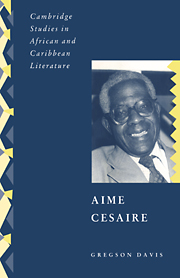Book contents
- Frontmatter
- Contents
- Preface
- Acknowledgements
- Chronology
- Introduction
- 1 From island to metropolis: the making of a poet
- 2 Exploring racial selves: “Journal of a Homecoming”
- 3 Inventing a lyric voice: the forging of “Miracle Weapons”
- 4 Lyric registers: from “Sun Cut Throat” to “Cadaster”
- 5 The turn to poetic drama
- 6 The return to lyric: “me, laminaria …”
- Epilogue
- Notes
- Bibliography
- Index
6 - The return to lyric: “me, laminaria …”
Published online by Cambridge University Press: 29 October 2009
- Frontmatter
- Contents
- Preface
- Acknowledgements
- Chronology
- Introduction
- 1 From island to metropolis: the making of a poet
- 2 Exploring racial selves: “Journal of a Homecoming”
- 3 Inventing a lyric voice: the forging of “Miracle Weapons”
- 4 Lyric registers: from “Sun Cut Throat” to “Cadaster”
- 5 The turn to poetic drama
- 6 The return to lyric: “me, laminaria …”
- Epilogue
- Notes
- Bibliography
- Index
Summary
Poetry is the only means I have found of learning to know myself. I have never known very well who I was, and poetry has been a perpetual conquest of myself by myself.
Aimé CésaireThe play, A Tempest marks the end of Césaire's concentrated exploration of the genre of poetic drama. After the creative storm that left the triptych in its wake, there followed a relatively extended interlude of silence, or at least, non-publication, on the literary scene. The interlude was only definitively terminated with the publication of a new collection of poems, moi, laminaire… (“me, laminaria … “) in 1982. To be sure, the silence had been broken at midpoint by the appearance of an ambitious edition of the author's complete works (œuvres complétes) in 1976 – an edition that included as a pendant (under the rubric Noria) a group of poems most of which had previously appeared in journals, notably Présence Africaine. If we exclude the lyrics of Noria, we are left with a picture of virtual inactivity on Césaire's part in the domain of literary composition for a period of just over a decade (1971 to 1982).
By contrast with this relative artistic quiescence, the 1970s were far from calm as far as the arena of politics is concerned. To some extent Martinique, like the rest of the New World, was experiencing the repercussions of the previous decade of turmoil – the social agitation of the 1960s, which saw the proliferation of radical student movements in the United States, Europe and the Third World.
- Type
- Chapter
- Information
- Aimé Césaire , pp. 163 - 177Publisher: Cambridge University PressPrint publication year: 1997



